December 2018
The Adults
30/12/18 13:03
Caroline Hulse, The Adults: A Novel (New York: Random House), 2018
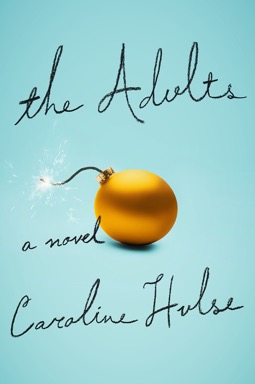
As a relaxing read the book is equally fun simply because the characters’ situations are nearly impossible. I don’t know people who would allow themselves to be put into such impossible situations. It isn’t a serious crime novel, either. Most laypersons know enough about investigations and the collection of physical evidence to recognize flaws in the techniques of the police in the novel. This, however, isn’t a problem for the reader because there is no attempt at surface realism. The reader is perfectly willing to suspend reality for the sake of a good story. It isn’t a great novel, but it is a fun story and worth a read for relaxation.
Spineless
30/12/18 12:52
Juli Berwald, Spineless: The Science of Jellyfish and the Art of Growing a Backbone (New York: Riverhead Books), 2017
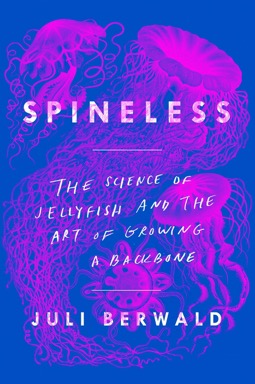
One of the tasks of scientists in this world with its rapidly changing global climate change and huge swings in populations of marine and land-based populations is the job of documenting just what is going on. Berwald is good at describing what has been observed in jellyfish populations and what that might mean for the health of the planet. Along the way she explores the sting of jellyfish and the different toxins with their treatments and descriptions of the pain that is inflicted. She teaches the reader not to draw premature conclusions. A large jellyfish bloom is not necessarily an indication of positive or negative factors in the environment. One has to look deeper to discern what it means.
Jellyfish are among the oldest creatures. The fossil record shows jellyfish very similar to contemporary species were existing during the time of the great dinosaurs. A creature that can survive so well through so many changes may have much to teach us about living in our world. She explore the so-called immortal jellyfish that has been observed reversing the normal cycle of age and returning to a younger, less mature state.
At first glance this book looks like it is for science geeks only. Reading it, however, reveals that it is a book for anyone who is interested in the world in which we live.
Pain Seeking Understanding
30/12/18 10:18
Keith C. Kraft, Pain Seeking Understanding: In Search of Hope and Healing (Self Published), 2018
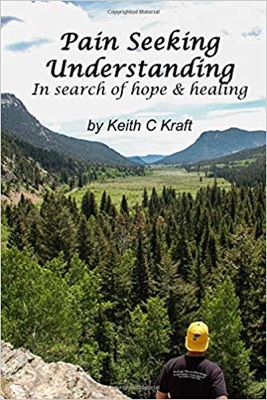
In the four years since Ben’s death, Keith has written periodically of the experience. Some of his reflections were published to the Internet on a blog. They are raw and honest and direct. I have been appreciative of Keith’s style, openness and most of all his honesty.
Now he has drawn those reflections together, added a few and done a bit of editing to produce a thoughtful and insightful book. It is not the kind of book that you want to sit down and read cover to cover, but rather one that you want to pick up, read a few pages, then put down and reflect. I’ve purchased copies of the book as gifts for my friends and will continue to share it with others. I took a copy to our Survivors of Suicide Support Group and others have expressed interest in it.
It is possible that we will never fully understand death by suicide. But seeking understanding can provide meaning and support for those who experience the deep pain of suicide loss. Keith’s book is a welcome addition to the literature on the topic.
The Forgotten Creed
30/12/18 09:15
Stephen J. Patterson, The Forgotten Creed: Christianity's Original Struggle against Bigotry, Slavery and Sexism (New York: Oxford University Press), 2018
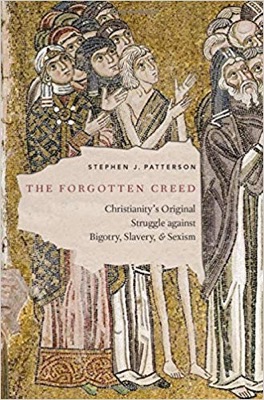
A single quote from Paul in Galatians reveals the possibility that the words were part of an oft used and familiar liturgy. If this is the case, the roots of the Jesus movement contained efforts to overcome bigotry, sexism and classism. Patterson takes us on a careful examination of “There is no Jew nor greek, no salve nor free, no male and female.” The journey winds through some pretty obscure texts and thoughts and one needs to have a bit of love for some obscure texts and following the footnotes, but the book is an easy read and one that I’d love to share with a group of lay people some time.
As is typical for Patterson, he allows the reader to draw their own conclusions, but it is also clear which way he is leaning. He is convinced that the words come from a baptismal liturgy and that they were familiar to those who were the first readers of Paul’s words and they illustrate that the struggle with divisions within the church are longstanding. We may have been wrestling with bigotry, classism and sexism for as long as we have been in the church.
I'll take the 18
30/12/18 08:37
Scott H. Galoodt, I'll take the 18: The Story of Beech 18 Freight Flying (Self Published), 2018
Scott Gloodt shares my love of the Beech 18 and has collected a wonderful treasure trove of stories about Beech 18s, mostly stories of freight flying in the 1970s ad ‘80s. At one point in my life I thought I’d be one of those pilots, but my life took me in a different direction. I didn’t lose my affection for the airplane.
I don’t know how this book would be for those who aren’t in love with the Beech 18, but for those of us who are, this is a wonderful book and a great read.
Fury of the Norse
24/12/18 10:29
Joseph J. Bohnaker, Fury of the Norse (Tempe, AZ: Third Millennium Publishing), 2018
All in all it is a fun story and an easy read - a good book for an evening of foul weather while sitting by the fire.
Whose Boat is This Boat?
24/12/18 10:15
Donald J. Trump (by Accident), edited by the Staff of The Late Show with Stephen Colbert, Whose Boat is This Boat?: Comments That Don't Help in the Aftermath of a Hurricane (New York: Simon & Schuster), 2018
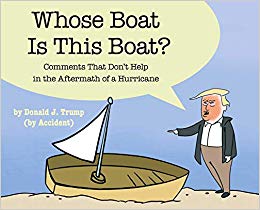
This book, put together by those who are certainly no fans of the President, is probably not worth the price of purchase. Still it is a silly way to get a laugh or two and I think there is some benefit in laughing at the hard things in life.
Some day we may be able to laugh more freely about this particular time in our nation’s history. Right now even though the late night talk show hosts are making hay out of the President’s poor spelling, lack of social skills, and general lack of composure and temperament for leadership, the situation in Washington DC is a bit too dangerous for comfort. After all the same person who doesn’t understand the basics of title, ownership and insurance holds the passwords to nuclear weapons capable of destroying all of humanity.
The Soul of America
24/12/18 10:10
Jon Meacham, The Soul of America: The Battle for Our Better Angels, (New York: Ramdom House), 2018
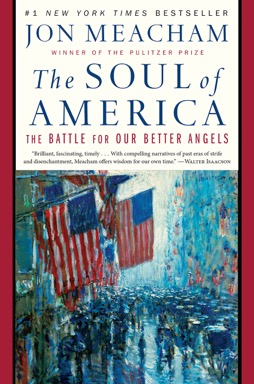
While Meacham clearly concludes that American democracy is resilient and well able to withstand the personalities of those who lead with less than competence, knowledge and skill. The attacks against our country from those within and without have been resisted and the fundamental commitments of freedom and justice have survived. I must admit that I was far less persuaded by his arguments than some of my colleagues with whom I discussed his book. Despite his assertion that ours is a time that fits into the flow of history, I still have a sense that the threats to our way of life are unique and especially dangerous.
The profiles contained in the book are well-researched and soundly written. Meacham has done his homework and it is refreshing to read an historian who has made an attempt at objectivity. The characters of those he profiles are mixed and some chapters are more compelling than others. I jokingly commented after reading the book that it seems that one thing that all presidents have had in common is insomnia. Many chapters begin with the things that are keeping the president from sleeping.
This is a solid and well-written book. It is well worth reading. It would be an excellent text for an overview of American History.
On the Brink of Everything
24/12/18 10:04
Parker J. Palmer, On the Brink of Everything: Grace, Gravity & Getting Old, (Oakland, CA: Berrett-Koehler Publishers), 2018
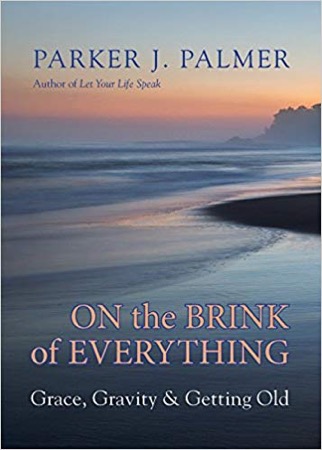
On the Brink of Everything is a courageous look at the realities of aging and mortality. None of us will go on forever. Knowing that life is limited makes it seem even more precious. The decisions we make do matter and this book is well worth the time to read it again and again.
The Complete Patrick Melrose Novels
24/12/18 07:28
Edward St. Aubyn, the Complete Patrick Melrose Novels: Never Mind, Bad News, Some Hope, Mother's Milk, and At Last, (New York: Picador), 2012.
All in all these are very well written novels with engaging, though not always likable, characters well worth a summer's read. Although the books stand well on their own, there is an advantage to reading them all at once. The completeness of the story that they tell is memorable and compelling. St. Aubyn is an author worth watching for other significant books.
In the Shadow of Statues
24/12/18 07:17
Mitch Landrieu, In the Shadow of Statues: A White Southerner Confronts History, (New York: Viking), 2018.
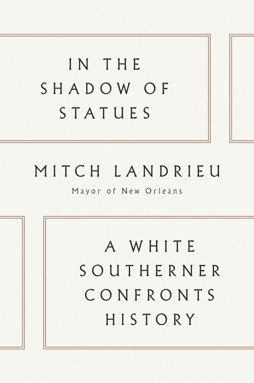
Landrieu spells out the painful legacy of the Civil War and reminds us that some of the most important struggles and disagreements of that time remain unresolved. The monuments we place in public parks and other venues can perpetuate a misplaced nostalgia for a time and place that never existed. Landrieu dares to tell the truth about the south - its history and its present - as he spells out a powerful memoir of the trials and difficulties of leadership.
We live in a deeply divided nation. Perpetuating falsehoods deepens the divide rather than bringing about the healing that is necessary for us to together forge a future.
Theft by Finding
24/12/18 07:07
David Sedaris, Theft by Finding: Diaries 1977- 2002, (New York: Little, Brown and Company), 2017.
Like much of the other published works by David Sedaris this book is fun to read even though his life and experiences are very different from my own. Gaining a glimpse into his world is entertaining and fascinating. He is an interesting person and his stories have a universal appeal. This, quite simply, is another winner by David Sedaris.
As for me? My journal entries probably will have to stand as they are. It doesn't seem likely that there will be a book anytime soon.